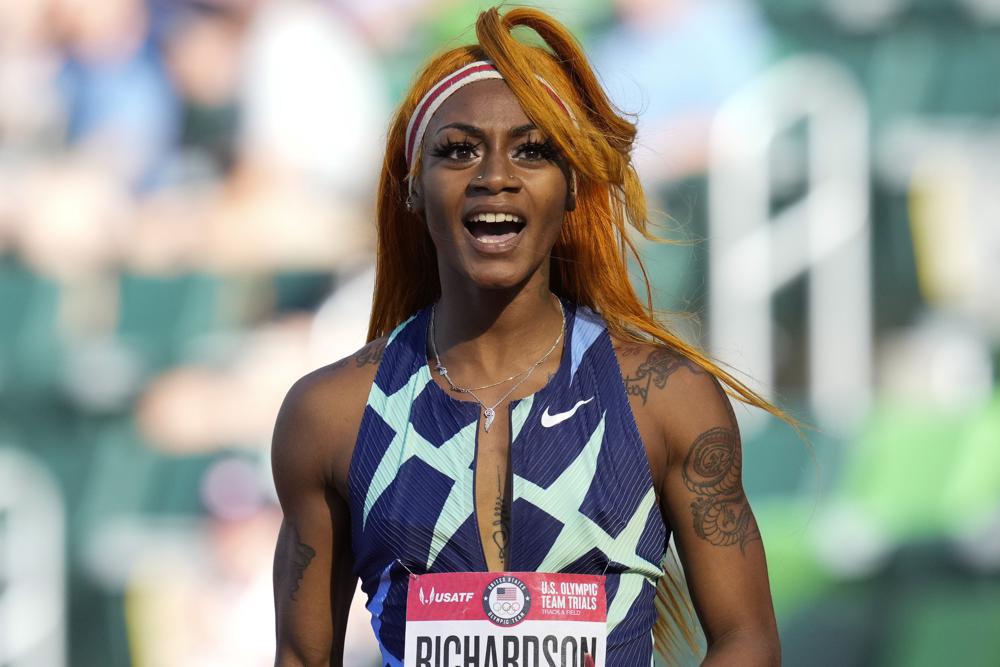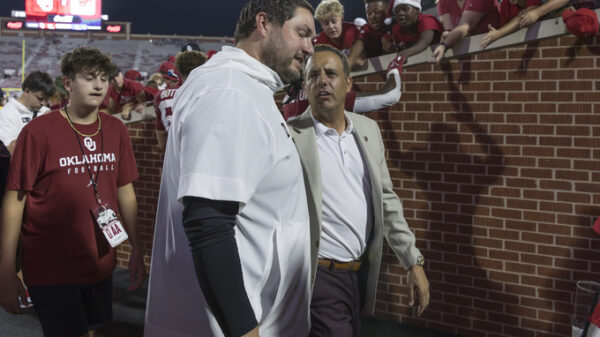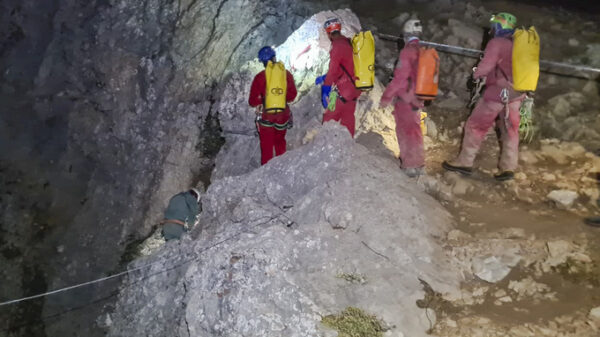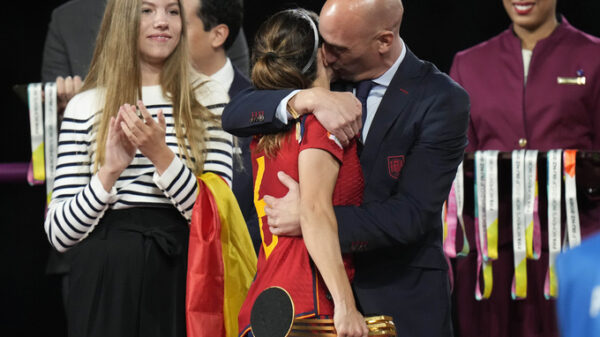FILE – In this June 19, 2021, photo, Sha’Carri Richardson celebrates after winning the first heat of the semis finals in women’s 100-meter run at the U.S. Olympic Track and Field Trials in Eugene, Ore. From doping, to demonstrations to dirty officials, the Olympics have never lacked their share of off-the-field scandals and controversies that keep the Games in the headlines long after the torch goes out. Only weeks before the start of the Olympics, the ban of American sprinter Richardson for a positive marijuana test fueled a debate about whether that drug — not considered a performance enhancer and now legal in some parts of the globe — should be forbidden anymore. (AP Photo/Ashley Landis, File)
TOKYO (AP) — From doping to demonstrations to dirty officials, the Olympics have never lacked their share of off-the-field scandals and controversies that keep the Games in the headlines long after the torch goes out. The five-year gap since the last Summer Olympics has been no different. A brief look at some of the most notable news to hit the Olympic world since it last convened for the Summer Games:
SEX ABUSE — Larry Nassar’s sexual abuse of hundreds of gymnasts in the U.S. opened a window into an abusive culture that permeates throughout the sport and in all corners of the globe. Since Rio de Janeiro, the U.S. Center for SafeSport opened to investigate complaints about abuse in sports. It took the decision-making process of these cases out of the hands of organizations such as USA Gymnastics, which for years had been forced to pit members (gymnasts) against members (coaches) when abuse allegations arose. Other abuse allegations in taekwondo, water polo and figure skating were among those that came to light in the United States, and the U.S. Olympic and Paralympic Committee rewrote its own bylaws to, in part, prioritize the mental and physical well-being of its athletes instead of the chase for Olympic medals.RUSSIA DOPING — In Rio, the IOC rejected a World Anti-Doping Agency recommendation to ban all Russian competitors from the Olympics as punishment for a wide-ranging scheme the country designed to help its athletes dope without getting caught. As a result, around 270 Russians were permitted to compete in 2016. Possibly emboldened by the IOC move, Russia continued to cover up its misdeeds. In 2019, WADA investigators determined that Russia had manipulated 23 gigabytes of data that could have been used to pursue cases related to the original cheating. WADA suggested a four-year ban with heavy restrictions on which Russians could compete, but the Court of Arbitration for Sport watered it down. The end result: Some 335 Russian athletes will compete in Tokyo, though not wearing team uniforms and not under the Russian flag. They officially will be competing as members of the “ROC,” or Russian Olympic Committee. Only 10 of those athletes will be in track and field; that sport’s governing body, whose former leaders enabled some of the cheating (see below), has since taken a much harder stance on the Russia case than most.
DOPING RULES — A spotlight shined on anti-doping rules that call on athletes to submit their whereabouts so they can be subjected to testing without notice. Reigning Olympic champions Christian Coleman and Brianna McNeal and world champion Salwa Eid Naser are among those missing the Olympics after being banned for violations of this rule. … And only weeks before the start of the Olympics, the ban of American sprinter Sha’Carri Richardson for a positive marijuana test fueled a debate about whether that drug — not considered a performance enhancer and legal in some parts of the globe — should be forbidden anymore.
WEIGHTLIFTING — Three of weightlifting’s longtime leaders were charged with a number of offenses for a decade’s worth of doping coverups and other crimes. The misconduct included 146 unresolved doping cases from 2009 through 2019. The international federation’s president, Tamás Aján, was ousted after a German documentary exposed the misdeeds. Weightlifting’s status for 2024 is in jeopardy; the IOC is calling for reforms and wants to see the sport cleaned up.
DEMONSTRATIONS — A summer of unrest and activism in the United States in 2020 forced the IOC and the USOPC to reckon with their policies on demonstrations at the Olympics. The USOPC, after months of meetings and negotiations, determined it would not sanction its athletes for violating Rule 50, which has long disallowed protests and demonstrations inside the lines. Though the IOC recently relaxed the rule to allow some forms of demonstration near the starting line, the ban on the medals podium remains, setting up what could be a conflict at the Olympics.
SPORTS GOVERNANCE — The IOC stripped the International Boxing Association’s Olympic status in the wake of an investigation in which the U.S. Treasury accused the organization’s president of involvement in drug production and heroin trafficking. … Influential Kuwaiti IOC member Sheikh Ahmad al-Fahad al-Sabah is awaiting trial on a forgery charge linked to an alleged coup attempt. … The former president of track’s governing body, Lamine Diack, and other top officials were found guilty of corruption for covering up cases in the Russian doping scandal in exchange for bribes. … Swimming’s international federation (FINA) has been under the microscope for a number of reasons, including electing a leader who was named an unindicted co-conspirator in a bribery case involving soccer’s top body. FINA also was criticized for not coming down harshly enough on Chinese Olympic champion Sun Yang, whose own doping/testing case meandered through the sports legal system for several years; Yang will miss Tokyo but be eligible for the Paris Games in 2024.
DOPING RULES — A spotlight shined on anti-doping rules that call on athletes to submit their whereabouts so they can be subjected to testing without notice. Reigning Olympic champions Christian Coleman and Brianna McNeal and world champion Salwa Eid Naser are among those missing the Olympics after being banned for violations of this rule. … And only weeks before the start of the Olympics, the ban of American sprinter Sha’Carri Richardson for a positive marijuana test fueled a debate about whether that drug — not considered a performance enhancer and legal in some parts of the globe — should be forbidden anymore.
WEIGHTLIFTING — Three of weightlifting’s longtime leaders were charged with a number of offenses for a decade’s worth of doping coverups and other crimes. The misconduct included 146 unresolved doping cases from 2009 through 2019. The international federation’s president, Tamás Aján, was ousted after a German documentary exposed the misdeeds. Weightlifting’s status for 2024 is in jeopardy; the IOC is calling for reforms and wants to see the sport cleaned up.
DEMONSTRATIONS — A summer of unrest and activism in the United States in 2020 forced the IOC and the USOPC to reckon with their policies on demonstrations at the Olympics. The USOPC, after months of meetings and negotiations, determined it would not sanction its athletes for violating Rule 50, which has long disallowed protests and demonstrations inside the lines. Though the IOC recently relaxed the rule to allow some forms of demonstration near the starting line, the ban on the medals podium remains, setting up what could be a conflict at the Olympics.
SPORTS GOVERNANCE — The IOC stripped the International Boxing Association’s Olympic status in the wake of an investigation in which the U.S. Treasury accused the organization’s president of involvement in drug production and heroin trafficking. … Influential Kuwaiti IOC member Sheikh Ahmad al-Fahad al-Sabah is awaiting trial on a forgery charge linked to an alleged coup attempt. … The former president of track’s governing body, Lamine Diack, and other top officials were found guilty of corruption for covering up cases in the Russian doping scandal in exchange for bribes. … Swimming’s international federation (FINA) has been under the microscope for a number of reasons, including electing a leader who was named an unindicted co-conspirator in a bribery case involving soccer’s top body. FINA also was criticized for not coming down harshly enough on Chinese Olympic champion Sun Yang, whose own doping/testing case meandered through the sports legal system for several years; Yang will miss Tokyo but be eligible for the Paris Games in 2024.
Copyright 2020 Associated Press. All rights reserved.









































